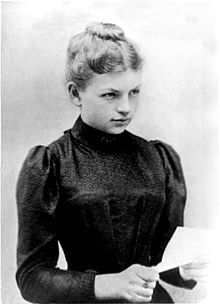Clara Immerwahr
| Clara Immerwahr | |
|---|---|

Clara Immerwahr (1870–1915)
|
|
| Born |
21 June 1870 Polkendorf near Breslau, Silesia Province, Kingdom of Prussia (present-day Poland) |
| Died | 2 May 1915 (aged 44) Berlin-Dahlem, German Empire Suicide |
| Residence | Germany |
| Nationality | German |
| Fields | Chemistry |
| Alma mater | University of Breslau |
| Doctoral advisor | Richard Abegg |
Clara Immerwahr (21 June 1870 – 2 May 1915) was a German chemist. She was the first woman to be awarded a doctorate in chemistry in Germany. She was also both a pacifist and a women's rights activist. From 1901 until her suicide in 1915, she was married to the Nobel Prize-winning chemist Fritz Haber.
Immerwahr was born on the Polkendorff Farm near Breslau (then in eastern Prussia; now known as Wrocław, in western Poland). She was the youngest daughter of Jewish parents, chemist Philipp Immerwahr and his wife Anna (née Krohn). She grew up on the farm with her three older siblings, Elli, Rose and Paul. In 1890, her mother died of cancer; while Elli and her husband Siegfried stayed at the farm, Clara moved with her father to Breslau.
Immerwahr studied at the University of Breslau, in 1900 attaining her degree and a Ph.D. in chemistry under Richard Abegg. Her dissertation was entitled Beiträge zur Löslichkeitsbestimmung schwerlöslicher Salze des Quecksilbers, Kupfers, Bleis, Cadmiums und Zinks (Contributions to the Solubility of Slightly Soluble Salts of Mercury, Copper, Lead, Cadmium, and Zinc). She was the first woman Ph.D. at the University of Breslau and received the designation magna cum laude.
Immerwahr married Fritz Haber in 1901, four years after she had converted to Christianity in 1897.
Due to societal expectations that a married woman's place was in the home, her ability to conduct research was limited. She instead contributed to her husband's work without recognition, translating his works into English. On 1 June 1902 she gave birth to Hermann Haber (1902–1946) the only child of that marriage.
...
Wikipedia
